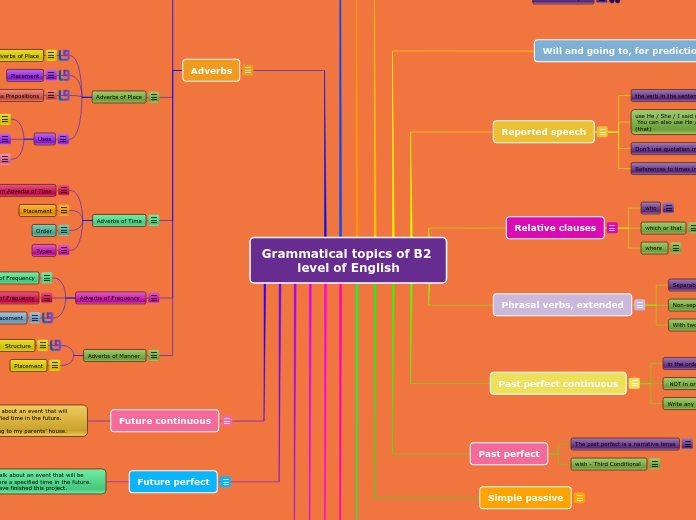Grammatical topics of B2 level of English
Would expressing habits, in the past
Used to + infinitive
Would
Past simple
Wish
wishes for the future
wishes for the present
were instead of was
wishes for the past
Will and going to, for prediction
'to be going to + infinitive
use the structure 'will + infinitive
Reported speech
the verb in the sentence may shift to a past tense
use He / She / I said (that) ...
You can also use He / She told me (that)...; I told him / her (that)
Don’t use quotation marks (“) when reporting speech.
References to times in the past also may need to change
Relative clauses
who
which or that
where
Phrasal verbs, extended
Separable
Non-separable
With two particles
Past perfect continuous
in the order they happened
NOT in order
Write any adverbs between had and been
Past perfect
The past perfect is a narrative tense
wish - Third Conditional
Simple passive
Narrative tenses
past simple
past continuous
past perfect simple
The first three verbs - opened, looked and walked - are a sequence: they are written in the order that the actions took place. We know this because they are in the past simple.
The past continuous verb, were blowing, shows an action in progress: the curtains started blowing before he walked into the room and continued to blow while he was there.
The last verb, had left, shows an action that happened before he walked in.
If we used the past simple for the last verb, the meaning would be different:
The window was open, the curtains were blowing. Someone left in a hurry.
This suggests that the person left after Bond walked in.
past perfect continuous
Adjectives
Descriptive Adjectives
Comparative and Superlative Adjectives
Attributive and Predicative Adjectives
Compound Adjectives
Proper Adjectives
Adjective Clauses
Adverbs
Adverb Placement and Order
Conjunctive Adverbs
Adverbs of Time and Frequency
Adverb Placement: Middle Position
Adverb Placement: End Position
Adverbs: Order
Comparative and Superlative Adverbs
Degrees of Comparison
positive degree
comparative degree
One-syllable Adverbs
Two-syllable Adverbs
Irregular Adverbs
Using 'than'
Using 'as … as'
Superlative Degree
One-syllable Adverbs
Two-syllable Adverbs
Using 'than'
Adverbs of Place
Interrogative Adverbs of Place
Placement
Adverbs of Place as Prepositions
Uses
Location
Direction
Distance
Adverbs of Time
Common Adverbs of Time
Placement
Order
Types
Adverbs of Frequency
Indefinite Adverbs of Frequency
Definite Adverbs of Frequency
Placement
Adverbs of Manner
Structure
Placement
Future continuous
Use the future continuous to talk about an event that will already be in progress at a specified time in the future.
This time next week, I’ll be driving to my parents’ house.
Future perfect
Use the future perfect to talk about an event that will be finished and complete before a specified time in the future.
This time next week, I’ll have finished this project.
Future perfect continuous
Use the future perfect continuous to talk about an event that will be in progress for some time before a specified time in the future.
Janet will be really tired when we get home. She will have been looking after the children all day!
Mixed conditionals
mixed first conditional sentences
If you give me some money, I can buy some milk.
mixed third / second conditional
He wouldn’t still be sick if he’d taken the medicine.
mixed second / third conditional
The presentation would have been more successful if you were better at speaking in public.
Modals – can’t have, needn’t have
Can’t Have
Susie can’t have said that. She is too nice and wouldn’t say such mean things.
Needn’t Have
We needn’t have studied so hard for the test. It ended up being canceled.
Modals of deduction and speculation
must have + past participle verb
‘They must have got out under the gate. There is no other way out.’
may have + past participle verb
might have + past participle verb
could have + past participle verb
‘They may have got out under the gate, or they might have escaped through this hole in the fence.’
may not have + past participle verb
might not have + past participle verb
‘He may not have got the message.’ / ‘He might not have received the message.’
can’t have + past participle verb
couldn’t have + past participle verb
‘They can’t have got out under the gate. I fixed that yesterday.’
